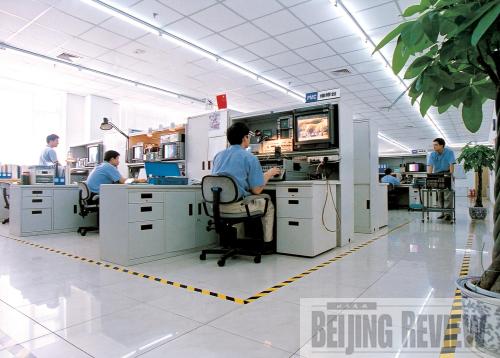|
 |
|
SERVICE PRIORITY: Professional technical service stations of China National Instrument Import and Export Corp provide high-quality maintenance services for global clients (YOURS COURTESY OF INSTRIMPEX) |
Rome was not built in one day—nor was China's foreign trade infrastructure. The depth and dynamism of the Chinese economy growing and developing for six decades has paved the way to allow imports and exports to prosper.
The experience of China National Instrument Import and Export Corp. (Instrimpex), offers a unique insight into how reform and innovation could easily inject steam into what would otherwise have been a languishing state trader.
 |
|
An Fengshou, President of Instrimpex (YOURS COURTESY OF INSTRIMPEX) | The trajectory of Instrimpex has been multiplied by a number of old-style Chinese state-owned trade companies.
Since its establishment in 1955, Instrimpex had been granted the then precious right to conduct the business of importing and exporting IT products, medical care and telecommunication equipment and advanced technologies. Under a centrally controlled economy, it had no reason to worry about sales or competitors. And in a few years, the company swiftly rose to become a trade house with a number of branches across the country, primarily due to solid state backing behind it.
Surely, Instrimpex's business record has been stellar: it has brought in China's very first set of satellite earth station, submarine cables, as well as air traffic control systems—all badly needed supplies for the startup economy.
Besides this, its exports of optical instruments, such as microscopes to east Europe and the former Soviet Union, though relatively small in value, also added some luster.
By keeping businesses afloat at an annual growth rate of around 10 percent, the company has made significant contributions to the nation's foreign trade sector during the first 20 years of its establishment, said An Fengshou, President of Instrimpex, told Beijing Review.
A bumpy ride
However, the turning point came in the late 1980s, when nationwide reforms deprived the unmatched advantages state-owned trade companies used to exclusively enjoy. Growing wary of the sleepiness of the command economy, policymakers loosened grip over a number of sectors in a cautious embrace of the more vibrant market-driven business model.
In the end, the state traders were left to make both ends meet on their own, while most importantly, numerous foreign and private local companies were allowed in to compete on equal footing.
The sweeping revitalization provided a chance for the trade sector to shine. But spoiled state traders needed a fairly long time to find their feet amid tough competition. And Strimpex was no exception.
Moreover, an outdated business model and poorly functioning corporate structure put it in a tight spot. Worse still, all its local branches became independent trade companies—or, rather, tangible rivals to Instrimpex.
"In the past, all we had to do was just to wait for orders swarming to our doorstep. But today, we have to go out to look for businesses." said Geng Baoku, Manager of Business Management Department of the company, told Beijing Review.
Geng added that the company suffered the worst in the early 1990s when the trade growth rate declined sharply. But the booming domestic demands and its entrenched customer network since have provided some respite.
Another effective cushion was provided by the increase of foreign loan projects. Since the 1980s, international institutions like the World Bank and the Asian Development Bank had extended a number of credit lines to finance Chinese water supplies and pollution treatment projects.
| 